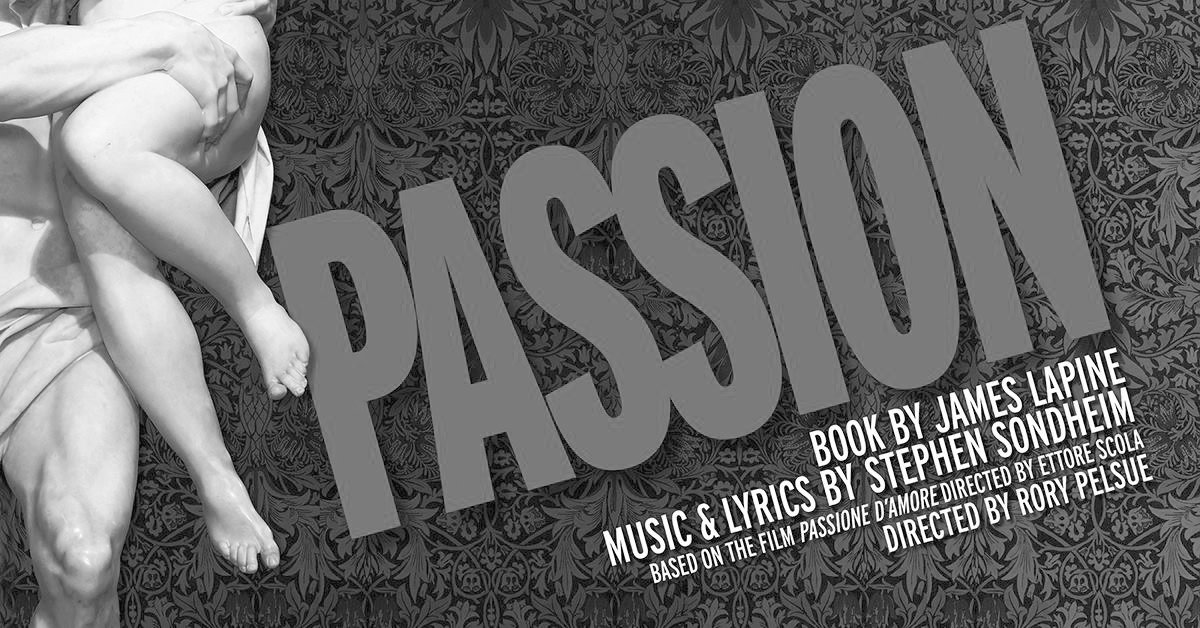
A terminally ill woman, hysterical and consigned to the attic, falls in love with a soldier camped at her home. Though she initially makes offerings of friendship, asking that they might talk and walk in the garden, her passion grows obsessive, and she hounds him relentlessly. He, caught between his desire to be kind to her in her suffering and his own love for a married woman on the other side of the country, tries to maintain distance but finds himself forced to offer companionship. Although he repeatedly tells her he wants to be left alone, she persists. After she collapses unconscious following him into the forest, he becomes ill carrying her back through the rain. He is given sick leave, but still, she follows him on the train home to his lover. When asked why she will not stop, she says that her love contains within it a beauty that he will one day understand. And eventually, he does.
The plot of “Passion,” written by James Lapine and Stephen Sondheim and directed by Rory Pelsue DRA ’18, initially appears boilerplate, following the long-distance love of Clara (played by Courtney Jamison DRA ’18) and Giorgio (played by Ben Anderson DRA ’18) as he is sent off to war. But it quickly turns into a deeply psychological study of the relationship between Giorgio and Fosca (played by Stephanie Machado DRA ’18). Theirs is a love that surpasses the boundaries of madness and consent. Fosca refuses to listen to Giorgio for most of the play, though her character does grow just as his does. The play is flawed but also beautiful. I could feel in my bones the love the two had for each other, pure and powerful as it overrode all obstacles.
The set, designed by Riw Rakkulchon DRA ’19, is a pale wooden floor, an oaken table and chairs. Though minimalist, it is very versatile, and with a few curtains pulled back and forth it artfully creates the space the play needs along with a kind of transparency that makes everything ghostly. This spectral feeling is strengthened even further by the lighting design of Nic Vincent DRA ’19, with characters often caught in an interplay of bone-whiteness and shadow. Some of the warmest moments are lit only by lantern, which gives our lovers a sense of wandering in an expansive darkness in search of each other. The costumes, designed by Matthew Malone DRA ’19, fit the status of the characters very well, especially the beautiful blue flowing gowns of Clara, the soldier’s first love, the same color as the paper with which she writes her letters. Shadi Ghaheri’s DRA ’18 choreography, primarily with the ensemble soldiers, lends a gripping urgency to the scenes. And Pelsue’s direction can be felt in every moment the characters reach out to each other and in every moment that they push each other away.
But the greatest aspect of the show was by far the performances. Jamison is an incredible singer, adding dimension to a character that is unfortunately underused by the script. The ensemble were all funny and lent a foundation to the world of the play, whether in the soldiers’ banter or the retelling of Fosca’s family history. The standouts, however, were Giorgio and Fosca. Machado walks a thin line with a character that could very easily be blandly pitiable or unsympathetically aggressive, but she brings true moments of joy to Fosca even in the midst of great despair. She becomes someone with whom the audience can empathize, even if we may disagree with how she pursues her love. And Anderson captures the transition Giorgio experiences between loves; Fosca’s effect on him as he slowly succumbs to the same maddening passion she experiences raises the hair on your neck.
I only saw a preview, and I was still amazed and felt so lucky to have had the chance to watch this performance. It was a story I never expected to earn my emotional investment, and yet I found myself rapt the entire time. Ultimately, while the play has its own hypothesis about what love is or should be, it answers very little. It does not convince the audience member of what is right or wrong in love. It does spark valuable questions about what it means to love someone. What it means to feel passion.
Zak Rosen | zachary.rosen@yale.edu







